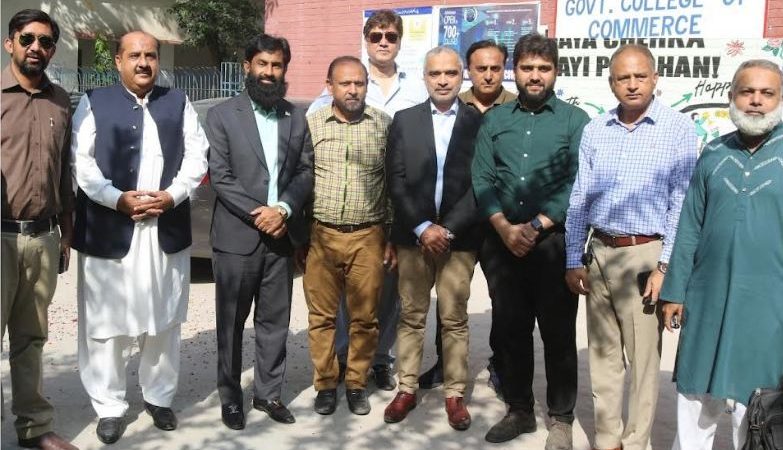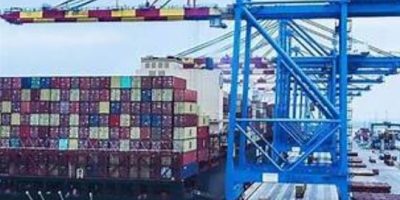PIAF wants effective policy for promotion of demand-driven technical education

LAHORE: /DNA/ – The Pakistan Industrial & Traders Associations Front (PIAF) Chairman Fahimur Rahman Saigol has called for formulating an effective policy for the promotion of demand-driven technical education and vocational training in Punjab, as the present setup of technical training is not addressing the requirements of modern industrialization.
These views were expressed by him along with Vice Chairman PIAF Tahir Manzoor Chaudhary and PIAF EC members on the occasion of Defense Day ceremony at Government College of Commerce Iqbal Tan. He distributed prizes among the successful students in speech and national anthem competition. College Principal Yaqub Elahi Sheikh, Senior Professors, Faculty Members including Professor Arif Iqbal, Sahibzada Azhar, Irfan Afridi, Mukhtar Hussain Bhatti, Ziaul Haq and others organized the programme. Earlier, the delegation was warmly welcomed and a bouquet was presented to the Piaf officials.
The PIAF Chairman observed that promotion of technical education is vital and much-needed for economic growth. He said that the collaboration between the industry and academia will ultimately bridge the skill gap, leading to a quantum jump in the country’s exports.
Fahimur Rahman said that the young generation should pay full attention to their studies because they have to take care of the country’s future.
Vice Chairman Tahir Manzoor Chaudhary assured of his practical cooperation to solve the problems of the college at the level of PIAF as well as at Lahore Chamber. The EC members PIAF Naeem Hanif, Zeeshan Sohail Malik, Shaban Akhtar, Tariq Sulaiman, Amir Ali, Omar Abdullah, Muhammad Abubakar Nadeem, Secretary PIAF Abda Lasboor Sheikh and others were also present in the event.
The speakers on this occasion said that the aggressive economic measures, high borrowing rates, inflation, oppressive taxation and unstable currency have been negatively affecting the trade and industry.
PIAF Chairman Faheemur Rehman Saigol observed that the ever-increasing cost of production in the country is the real threat to both large-scale manufacturing and small-scale businesses, as frequent upward revisions in policy rate and continuous fluctuations in rupee against dollar are posing further challenges.
They said that the government does not have any pragmatic plan to address this liability, apart from asking for more loans to repay existing debt. Likewise, the target for current financial year’s exports is too low to meet the country’s revenue.
According to the data, the pace of growth in LSM industries is suffering because of restrictions imposed on imports that have caused a shortage of imported raw material. The steep currency devaluation has also made raw material expensive and business models unviable.
The International Monetary Fund (IMF) assessed that the pace of negative growth in big industries could have been slower had the government not imposed restrictions on imports. The central bank has issued the guidelines to commercial banks about the allocation of foreign currency for import purposes.
Faheem Saigol said that the LSM trend indicates that this year that the overall Gross Domestic Product (GDP) growth rate may remain around 1% due to the shutdown of industries and adverse impact of the devastating floods on the agriculture sector. The government had targeted economic growth of 5.1% in the current fiscal year but the latest estimates – both by the IMF and the federal government – indicate that growth will be marginally in the positive territory.
Since large industries contribute heavily to revenue collection and job creation, any change in their growth impacts the government and business sentiment across the board. The businesses are also facing demand for advance income taxes from the Federal Board of the Revenue (FBR), coupled with a slow release of genuine refunds (from non-exporting sectors).
The LSM sector contributes nearly one-tenth to total national output, however, a constant decline in the share and growth of LSM may cause a lot of problems for the government already struggling to create
new jobs.
Related News

Apparel exporters appeal PM for strong Pak presence at MAGIC USA 2026
DNA LAHORE: The value-added textile and apparel export industry of Pakistan has expressed serious concernRead More

German Envoy, ICCI pledge to foster business-to-business linkages
German Ambassador, ICCI President agree to act as bridge between German investors, Pakistani enterprises ISLAMABAD,Read More


Comments are Closed